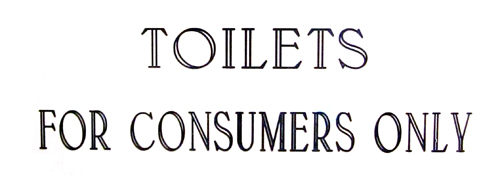The sign above points to the toilets of the cafeteria at the Musée de l’Armée in Paris. The Kid and I were at the museum a couple days ago, and he spotted the sign, insisting I shoot it. So I did, and here we are.
Now, lest you think that “consumers” is bad Franglish for “customers,” here’s the same sign in French:
Looks to me like a literal translation.
And, it also seems to me, the term “consumer” is far more deeply embedded in Europe than it is in the U.S. Here (I’m back now) I can ask people to say “customer” instead of “consumer,” and they don’t have much trouble with switching. In Europe (especially in the U.K.) it’s harder. I don’t know why.
Still, I think the literal meaning of the word is an issue, and has been for some time. Here’s John Perry Barlow, in Death From Above, his March, 1995 Electronic Frontier column for Communications of the ACM:
Over the last 30 years, the American CEO Corps has included an astonishingly large percentage of men who piloted bombers during World War II. For some reason not so difficult to guess, dropping explosives on people from commanding heights served as a great place to develop a world view compatible with the management of a large post-war corporation.
It was an experience particularly suited to the style of broadcast media. Aerial bombardment is clearly a one-to-many, half-duplex medium, offering the bomber a commanding position over his “market” and terrific economies of scale.
Now, most of these jut-jawed former flyboys are out to pasture on various golf courses, but just as they left their legacy in the still thriving Cold War machinery of the National Security State, so their cultural perspective remains deeply, perhaps permanently, embedded in the corporate institutions they led for so long, whether in media or manufacturing. America remains a place where companies produce and consumers consume in an economic relationship which is still as asymmetrical as that of bomber to bombee.
Eating isn’t a bad metaphor for what we do with the products we buy. But it’s not all we do. For example, I’m writing this on a computer. Is “consuming” all I did with that computer when I bought it? And what about the writing I’m doing now? Writing is production, not consumption. In fact, much of what we do with our electronic devices involves producing information rather than consuming it.
And is information something we consume? Or is it something else? Here’s what I wrote for my chapter of Open Sources 2.0:
Several years ago I was talking with Tim O’Reilly about the discomfort we both felt about treating information as a commodity. It seemed to us that information was something more than, and quite different from, the communicable form of knowledge. It was not a commodity, exactly, and was insulted by the generality we call “content.”[1]
Information, we observed, is derived from the verb inform, which is related to the verb form. To inform is not to “deliver information,” but rather, to form the other party. If you tell me something I didn’t know before, I am changed by that. If I believe you and value what you say, I have granted you authority, meaning I have given you the right to author what I know. Therefore, we are all authors of each other. This is a profoundly human condition in any case, but it is an especially important aspect of the open source value system. By forming each other, as we also form useful software, we are making the world, not merely changing it.
The footnote goes to this:
↑ I had the same kind of trouble when I first started hearing everything one could communicate referred to as “content.” I was a writer for most of my adult life, and suddenly I was a “content” provider. This seemed ludicrous to me. No writer was ever motivated by the thought that they were “producing content.” Their products were articles, books, essays, columns, or (if we needed to be a bit more general), editorial. “I didn’t start hearing about `content’ until the container business felt threatened,” John Perry Barlow said.
“Consumer” is the noun form of the verb to consume. Here’s what Dictionary.com says consume means:
con·sume
–verb (used with object)
1. to destroy or expend by use; use up.2 to eat or drink up; devour.3. to destroy, as by decomposition or burning: Fire consumedthe forest.4. to spend (money, time, etc.) wastefully.5. to absorb; engross: consumed with curiosity.–verb (used without object)
6. to undergo destruction; waste away.7. to use or use up consumer goods.
So what does #7 say? That there is a class of goods meant to be destroyed or expended by use? Well, yeah.
Are we past that? I hope so. We certainly have more reason to be.


Leave a Reply